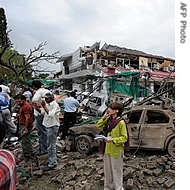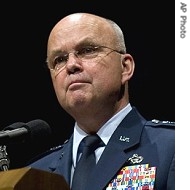VOA标准英语2008年-Revenge for Danish Cartoons Blamed for Pak Blas(在线收听)
By Gary Thomas
Washington
02 June 2008
The uproar over the 2005 publication of Danish cartoons of the Prophet Mohammad may have faded in the West, but analysts believe angry Islamic militants may still be seeking revenge. VOA correspondent Gary Thomas reports.
 |
| Pakistanis gather beside destroyed cars and the damaged building of the United Nations Development Program (UNDP) adjacent to the Denmark embassy following a suicide attack in Islamabad, 02 Jun 2008 |
Analysts say the perpetrators of a car bombing at the Danish embassy in Islamabad Monday appear to have adhered to the old proverb that revenge is a dish best served cold.
The attack occurred more than two years after cartoons first appeared in Denmark caricaturing the Prophet Mohammad, sparking outrage in the Muslim world. Islamic precepts prohibit any depiction of the founder of their religion, much less a caricature. Denmark has faced renewed terrorist threats since several Danish newspapers reprinted one of the caricatures in February.
Christine Fair, a South Asia analyst for the RAND Corporation, says the controversy over the cartoons may have faded in some areas, but not in Pakistan.
"Here in the West, these things spike and then they taper off. In other words, there's a lot of media interest, then everyone forgets about them," she said. "I'm struck when I go to Pakistan that there is just constant anger over the cartoons, and it's not something people have forgotten. Just because it's out of our media cycle doesn't mean that it's out of theirs."
Robert Richer, former deputy chief of operations for the CIA, says the attackers were patient.
"There have been a number of [Muslim] clerics, particularly based in Pakistan, who said that the Danes would pay for those cartoons," he said. "Someone decided they were going to go after that Danish target and make a point, and it's just taken them a while to get to it."
No one has claimed responsibility for the attack. Some accounts have blamed it on al-Qaida. However, analysts say that, given the large number of Islamic militant groups operating in and around Pakistan, particularly in the wild belt of tribal lands along the Afghan border, it is impossible to say with certainty who carried out Monday's attack.
 |
| Central Intelligence Agency Director General Michael Hayden (file photo) |
But Richer says that a recent interview given by CIA director Michael Hayden may also have been a factor in the attack.
"General Hayden made some very strong comments about al-Qaida not necessarily being on the run, but much more tactical in nature, diminished in stature worldwide, particularly in nature of Saudi Arabia and Iraq," he said. "They've got to do something. You know, this may not have been an al-Qaida attack, but it is an attack that draws attention back to the fact that these groups can take action."
The Pakistan government has been carrying on peace talks with Islamic militant groups operating out of the tribal areas. Christine Fair says the attack is not necessarily linked to those peace deals, but a bombing in the center of the capital is still an embarrassment to the government.
"I don't think there's any reason to connect this to those deals at all, because there are so many different militant actors in Pakistan, many of whom have realigned their targeting and their priorities," she said. "But, obviously, it doesn't do well for them to be having an attack on an embassy in Islamabad.
IntelCenter, a private contractor that works with U.S. intelligence agencies, says an al-Qaida-produced videotape released in 2007 rejects the concept of immunity from attack for embassies or consulates.